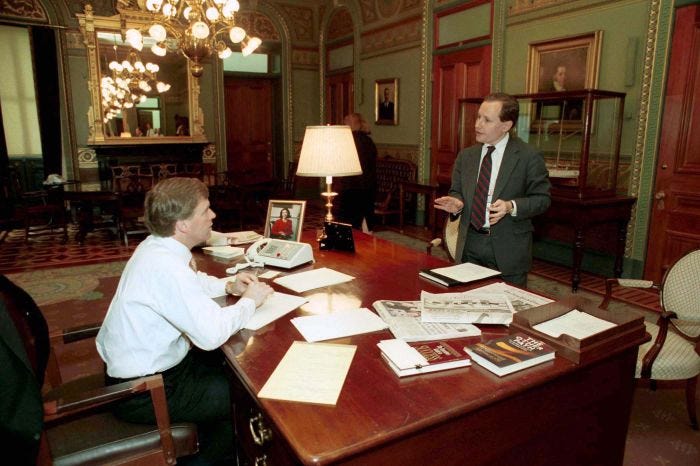When Did Compromise Become a Four Letter Word?
Has partisanship gone too far?
Congress is back after its summer recess, but it might as well still be on break, because not much is happening.
A government shutdown is looming. Again. It’s the same Groundhog Day experience that occurs every handful of months. This time, they have until September 30 to get twelve budget bills passed.
Speaker of the House Mike Johnson’s plan was to punt, by passing a stopgap bill that would keep everything the same for now, and deal with it again in March. (These stopgaps are called Continuing Resolutions, or CRs.) But enough members of his own party objected, so he had to cancel the vote.
This Congress has famously been the least productive in history, and they aren’t doing the most basic function of their job — namely, passing a budget. Their approval is at record lows and they sacked Speaker of the House Kevin McCarthy last year for trying to avert the exact same problem we’re faced with now. In order to keep things from grinding to a halt, McCarthy worked with Democrats to keep the government open. But in response, he was removed from his role as Speaker.
When did compromise become a four letter word? Keeping the government open — making sure members of the military are paid on time, for example — isn’t controversial. Everyone agrees shutting down the government is a massive waste of taxpayer money.
But compromise, it seems, can and will be weaponized against you.
Now, if you work with somebody across the aisle, you risk your career in Congress.
I spoke with Bill Kristol about this. He’s the editor-at-large for The Bulwark, a newsletter that’s also on Substack. He also worked for decades in Republican politics, including as chief of staff to Vice President Dan Quayle in the George H.W. Bush administration.
In the past, it wasn’t that everyone always compromised, he said, and he remembers Senators and members of Congress thinking they deserved to be rewarded for compromising or governing. I don’t think much has changed on that front.
But now, he says, “partisanship has increased to an extraordinary degree. The parties are now almost tribes that match up against each other. The parties have become much more ideological.”
And it’s not just in Washington. Sure, the partisanship was visible in DC, but not in small towns in Kansas or Oklahoma or Florida.
Now, you don’t have to look further than a school board meeting.
We wouldn’t accept this behavior form children in school.
Kristol blames it on something I say all the time: A large part of the country doesn't put principle over party.
He says this “kind of tribal sentiment is dangerous. It’s one thing to have politics that's a little bit partisan or gridlocked, but another when it takes over social and cultural institutions, churches, educational institutions. That's not healthy.”
It’s true. And now there’s evidence that Russia has been attempting to infiltrate our political discourse by planting pro-Russian stories with certain media figures who may or may not have been aware that they were actually spreading Russian propaganda.
Our adversaries benefit from a divided America. Actively hating your neighbor for a sign they have in their yard, or crossing the street to avoid having to make small talk with someone you disagree with? That actually plays right into the hands of America's enemies, who benefit from division and chaos.
Kristol says a lot of people he talks to don’t even realize that the information they’re getting on social media comes from Russia or China or Iran.
Kristol: “I think social media has been a big part of this…people just tend to talk to or read or watch other people they agree with. We used to be a country where people who don't agree with each other get together in church or participate in civic associations or even work together in governments or politics. Now churches are divided, people don't read the same news and they don't enjoy the same entertainment.”
When did we decide that we need to punish people for doing the right thing (like their jobs)?
It doesn’t have to be this way.
Pay attention to the people representing you, and the people you surround yourself with.
Do your members of Congress put doing work for their district and state first, or do they spend their time giving press conferences and going on TV?
Every member of the House is up for reelection in November, and so are one-third of Senators. We still have time to send a message: enough. Don’t vote for people who don’t do their jobs.
Compromise still has ten letters.







It is very frustrating to watch Congress be so ineffective. It is equally frustrating to live in such a gerrymandered region that voting the people being ineffective out is virtually impossible (or feels that way). I have contacted my Congressional reps multiple times about this. And yet when they speak publicly or in Congress it's to increase the division. Political parties are not teams and Congress is not a competitive sport. We have to get back to discussing how to meet in the middle when discussing funding the government and other important legislation. When have any of us ever gotten everything we've wanted? Why would government policies be any different?
It is a shame they are able to receive their own salaries when they fail to fund the salaries of other federal employees.